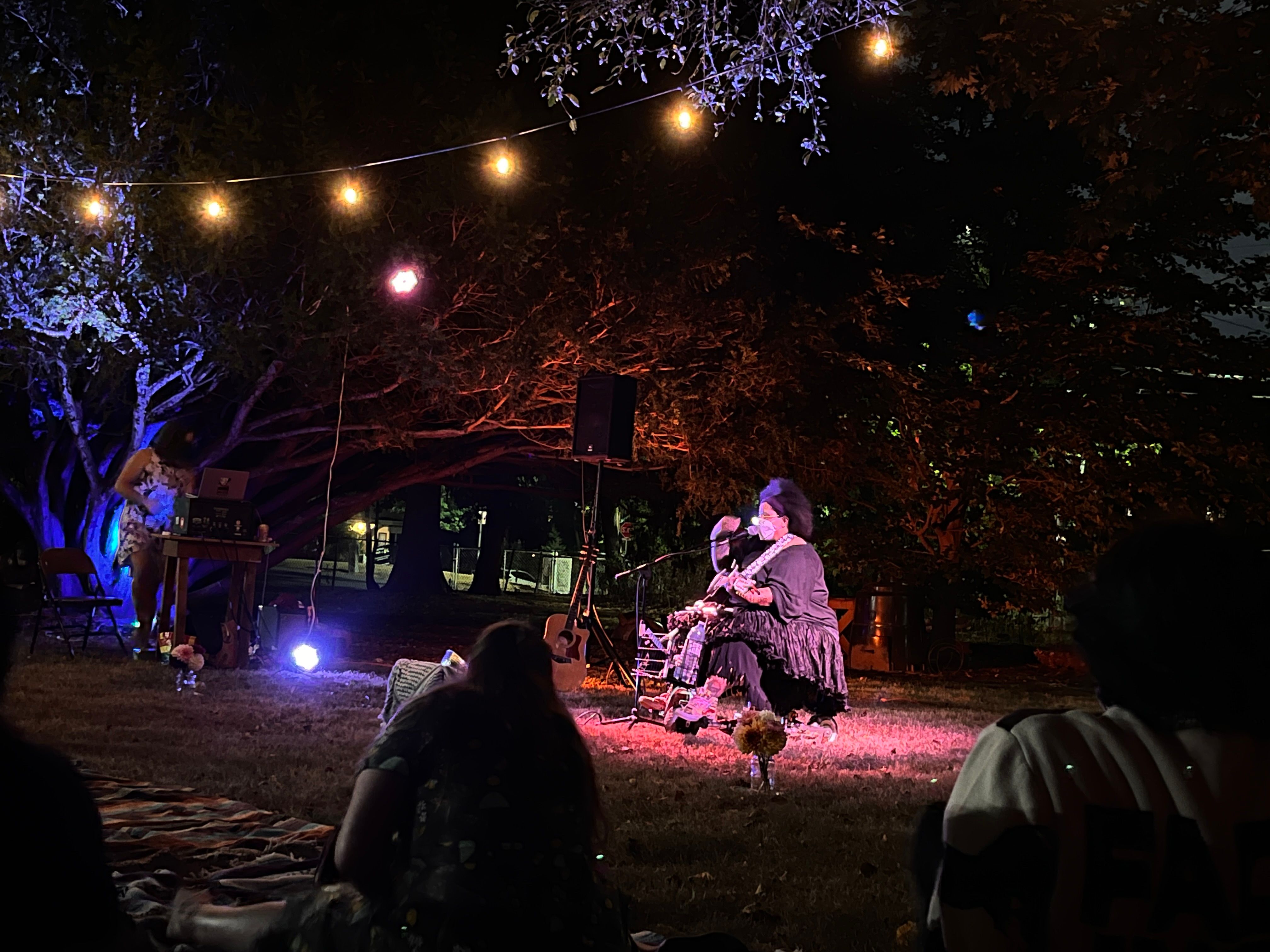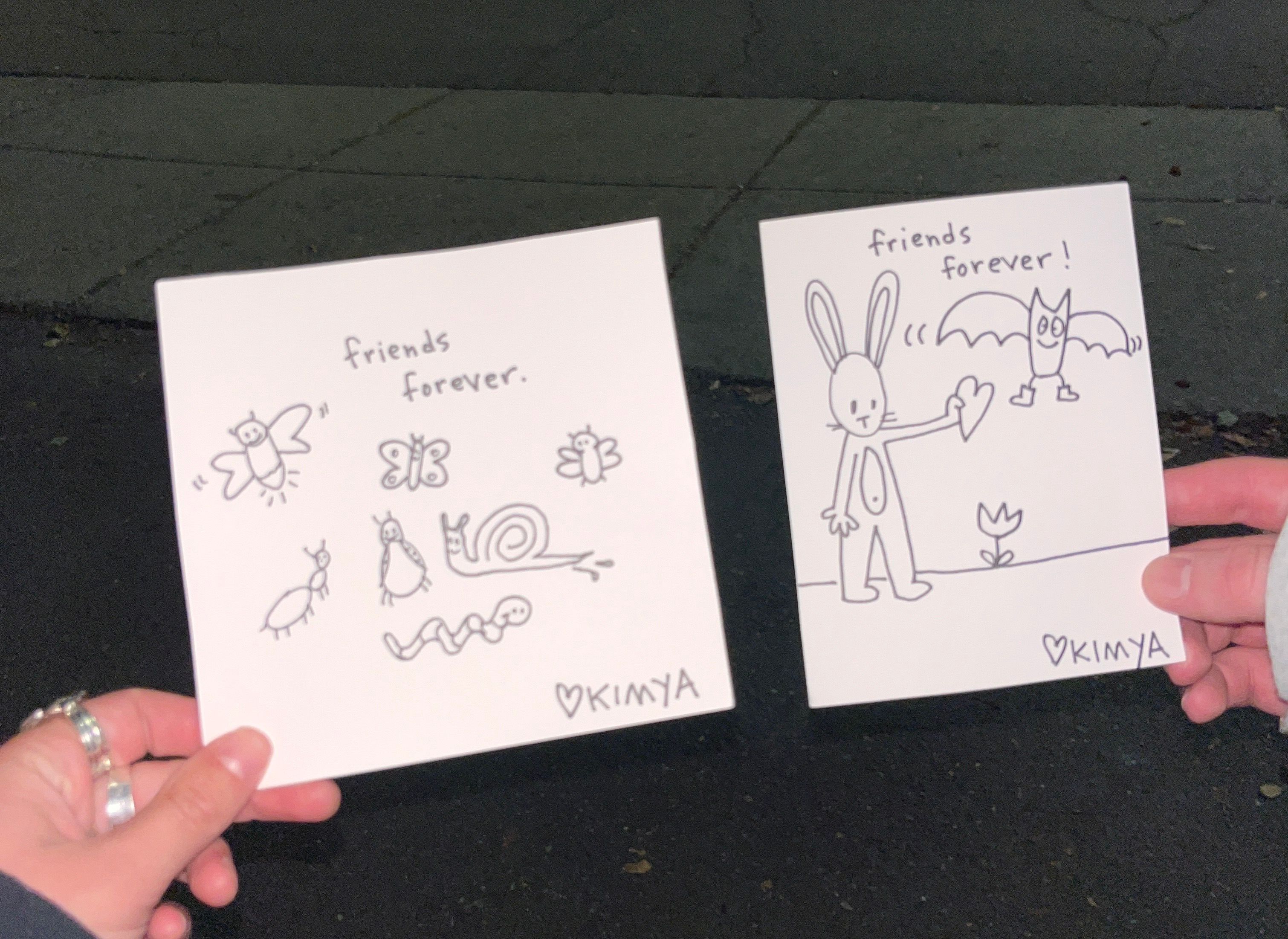Kimya Dawson shines in Jamaica Plain

It’s a Tuesday night in Jamaica Plain, just starting to cool down after a sunny, late-summer day. People of all ages gather on the lawn of Hope Central church with foldable chairs and picnic blankets. There’s a snack table and someone’s just announced that pizza is on the way. It feels like I’ve walked into a family cookout or a casual graduation party, but no: I’m about to watch the legendary Kimya Dawson play a beautiful, intimate show in Boston’s backyard.
Dawson came to Boston as part of a series of one-off East Coast shows born from a desire to avoid going home. She tells the crowd that she’s just dropped her child off at college and fears the emptiness of the apartment they shared back in Seattle. Dawson posts on Instagram occasionally looking for outdoor venues; as luck would have it, Evan Greer, local artist and queer event organizer, had a backyard. When tickets to Evan’s backyard show sold out, she quickly organized a larger space at Hope Central.
I am awed by the cozy atmosphere Dawson’s friends and fans constantly create—with almost 900,000 monthly listeners on Spotify and a tiny venue, I expected more chaos. Instead, the lawn is friendly, quiet, strung with lights. Kids swing on the playset.
After a beautiful opening set by Greer, Dawson takes her place in front of the crowd. It’s just her and her guitar. Having seen her play with The Moldy Peaches the summer before, I am eager to see her shine alone—the majority of her solo music is stripped down, DIY. The crowd was hushed and, underneath their masks, beaming.
Dawson has a sun inside her. It’s obvious to me, this magnetic force she carries, as she sings heartfelt songs about family, friends, and the world. She performs with a powerful gentleness, at once commanding my attention and soothing my soul. Her music is sweet and savory. It’s self-love and tragedy in between lyrics about farts. She apologizes for her raspy voice, but it’s invisible and unimportant to those of us who know and love her authenticity.
Dawson fills the space between songs with personal anecdotes (and a few curses at the mosquitos attacking her). In the song “Underground,” she writes that instead of putting her body in a casket when she dies, she wants someone to “burn it and put the ashes in a basket / and throw them in the Puget Sound.” But recently she’s been thinking that the sea is too scary. She’d prefer to be in a lake, specifically the lake where she went to summer camp, “so I can hear children laughing and playing all the time.” Thoughts like these make the show feel less like a concert and more like a conversation you’d have with a rambling roommate. She can’t help but segue, she says, having formerly performed as a stand-up comedian. Other stories shout out “sticktok,” bats, and her many musical friends.
Most powerful is her segue into a song about using a wheelchair. She mentions hateful comments on social media about her weight or disability, but points out that comments defending her can be just as hurtful. “People see me and they think, oh, poor Kimya, it must be awful to be her,” she says, “I’m alright. I’m living my life.” She rejects pity. Accessibility is vital to her shows; masks are required and the port-a-potty accommodates wheelchairs.
After the show, Dawson sits at the front of a long line and sells hand-drawn cards and t-shirts, raising money for Palestine. She takes time to connect with each fan who waits to talk with her. It’s well worth the wait—my hand-drawn collection of smiling bugs is titled “friends forever.” It’s now one of my most prized possessions.
I leave the Kimya Dawson show feeling liberated, both softer and stronger. Her music is touching and gracious, her presence on stage unquestionable. It’s rare to see an artist so raw and so real, and I feel honored to have witnessed her magic in this intimate corner of Boston. As Dawson is not regularly touring, if you get the chance to see her live, I urge you to take it with both hands. It will feel like reconnecting with an old friend, like sewing a patch on your heart, like eating dinner at your aunt’s house and remembering that she loves you.
